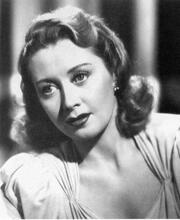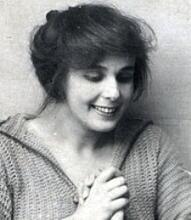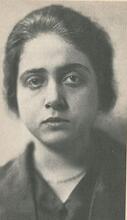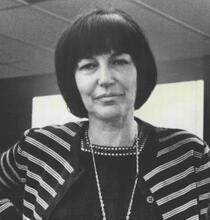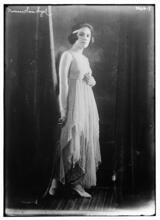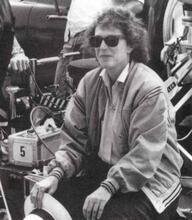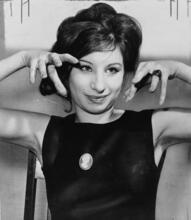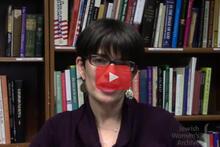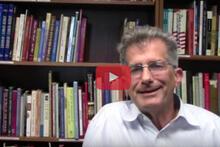Zoe Wanamaker
Zoe Wanamaker in 2013, image courtesy of Ed Ednayat via Wikimedia Commons.
Born in New York, Zoë Wanamaker moved with her family to London when she was three, when her father, the actor, director, and founder of London’s Globe Theatre, Sam Wanamaker, was going to be investigated by the House Un-American Activities Committee. She was a member of the Royal Shakespeare Company from 1976 to 1984, and her performance in Sophocles’ Electra from 1997 to 1999 in the United Kingdom and on Broadway earned her an Olivier Award and a Tony nomination. Wanamaker was nominated for BAFTA awards for her roles in Prime Suspect in 1991 and Love Hurts in 1993, but she may be best known to younger audiences for her role as Madame Hooch in the 2001 film Harry Potter and the Philosopher’s Stone. She has played numerous guest roles on BBC television shows and was honored as a Commander of the British Empire in 2001.
Overview and Early Life
Zoe Wanamaker, the recipient of numerous awards for both her stage and television work, is known to millions of cinemagoers worldwide for her role as Madam Hooch in the film Harry Potter and the Philosopher’s Stone (2001).
Wanamaker was born on May 13, 1949, in New York City, but moved to London with her family when she was only three years old; some time in 1950 or 1951 her father, the actor, director and founder of London’s Globe Theatre Sam Wanamaker (1919–1993), learned that he had been blacklisted and was about to be investigated by Senator Joseph McCarthy and his House Un-American Activities Committee. Already in London making a film, he decided to stay in England and bring over his wife, the actress Charlotte Holland, and their two daughters Abby (b. 1942) and Zoë. The family settled first in Denham, near Pinewood Studios, and then moved to St. John’s Wood in London.
Though both Sam and Charlotte were Jewish and were married by a rabbi in Chicago, they were entirely secular; Zoë sensed that Sam’s own youth had been marred by anti-Jewish sentiment and that he did not want his own children to suffer similarly. But through Jewish family friends, notably Hugh Gaitskell—with whose daughter Zoë occasionally went to the Liberal Jewish Synagogue in St. John’s Wood—and Teddy and Lois Sieff, whose daughter Jenny was Zoë’s best friend, the family from time to time observed some festivals and traditions. The Wanamaker daughters grew up with a sense of slight exoticism, occasionally translated into a sense of not quite belonging, as much because of their parents’ American accents—and the unusually gaudy (by post-war English standards) clothes that their father would bring them back from his trips to the United States—as because of their Jewishness. In a gesture characteristic of Sam and Charlotte’s liberalism, their three daughters (Jessica was born in London in 1954) were all sent to different schools, each one having been chosen as appropriate to the girl’s character and academic leanings. Zoë went to King Alfred’s School in Hampstead, a private co-educational school well-known for its progressive educational agenda. Not particularly academic, but in need of a few more boundaries than she was being set at her London day school, she was later sent to a Quaker boarding school, Sidcot School in Somerset.
Acting Studies and Career
Neither Sam nor Charlotte encouraged Zoë to pursue an acting career. She had not distinguished herself academically while at school, but she gained a place at Hornsey School of Art to pursue her interest in art, after which she worked briefly as a secretary. In 1967, having realized that she really did want to act, she applied to and was offered a place at Central School of Speech and Drama.
Almost immediately after leaving drama school she landed a job at the Manchester Royal Exchange, playing Hermia in A Midsummer Night’s Dream, directed by Michael Elliot, alongside Brian Cox as Oberon. Heeding her father’s advice to gain experience in repertory theater as the best way to learn about acting, she stayed in provincial repertory for several years.
In 1976, she joined the Royal Shakespeare Company, where she played several leading roles. She was appearing increasingly on television, in programs that ranged from Shakespeare, adaptations of Dickens, Anthony Powell and Mervyn Peake, to detective stories and comedies. It was her role as Tessa Piggott in the television series Love Hurts in 1992, alongside Adam Faith, that made her a household name. Further roles, such as Madam Hooch in the film Harry Potter and the Philosopher’s Stone, and Susan Harper in the sitcom My Family with Robert Lindsay, have confirmed her as one of Britain’s most enduringly popular and talented actors. Meanwhile she has continued performing on stage, taking the lead role in Sophocles’ Electra, directed by David Leveaux, which toured the UK and transferred to Broadway (1997–1999), and most recently appearing in David Mamet’s Boston Marriage (2001), in His Girl Friday (2003), a stage adaptation of the Ben Hecht and Charles Macarthur novel Hold the Front Page, and in Awake and Sing! (2006), for which she received a Tony nomination.
In 1988 Zoë Wanamaker met the actor and writer Gawn Grainger while filming Bob Hoskins’s Raggedy Rawney in Prague, where they became friends. Several years later, both in the throes of dealing with profound grief, they met again after Gawn’s wife had died of cancer. Sam Wanamaker was then extremely ill with prostate cancer, from which he died in December 1993. In 1994 Gawn and Zoë married and she became the stepmother to his two children, Charlie (b. 1976) and Eliza (b. 1981), whom she describes as “fantastically generous and loving, great people”—an epithet that might well be applied to Zoë herself.
“BAFTA Awards Search | BAFTA Awards.” awards.bafta.org. Accessed March 12, 2022. http://awards.bafta.org/keyword-search?keywords=wanamaker#.
“BBC - Who Do You Think You Are? - Zoë Wanamaker.” www.bbc.co.uk, n.d. https://www.bbc.co.uk/whodoyouthinkyouare/new-stories/zoe-wanamaker/ind….
Books, Itv. Who’s Who on Television : A Fully Illustrated Guide to 1000 Best Known Faces on British Television. London: Itv Books In Association With M. Joseph, 1982.
Kilburn, Michael., and Alberto. Arzoz. London's Theatres. London: New Holland, 2002.
Williams, Simon. The Cambridge Encyclopedia of Stage Actors and Acting. Cambridge, 2015.


